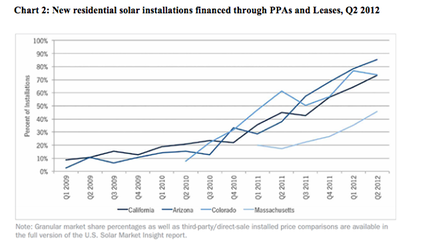 When individuals and businesses are thinking about adding solar PV to their roof, the first concern is usually the cost. While most every form of electric generation is financed and amortized over time, solar is generally seen as an up-front investment - and many times this presents an insurmountable barrier for the consumer.
When individuals and businesses are thinking about adding solar PV to their roof, the first concern is usually the cost. While most every form of electric generation is financed and amortized over time, solar is generally seen as an up-front investment - and many times this presents an insurmountable barrier for the consumer.
Third Party Solar companies offer a way to address this barrier. The third party will own the system on the roof and charge the customer a lease for the system that pays back the cost of the system over time. The third party owner takes advantage of the federal tax credits (currently at 30% of system cost), state incentives and the depreciation value.
States may either explicitly or implicitly prohibit this type of arrangement. For example, many states have franchise agreements, where one utility is granted a franchise to provide electricity and no other entity may sell electricity in their market. In these cases, explicit legislation is needed to authorize these types of third party solar arrangements.
Effectively, in a third party arrangement, the third party company is an intermediary between the customer and the utility - net metering their power back to the utility and receiving a payment for the performance of the system (known as a PPA - Power Purchase Agreement) and also leasing the system and its electrical production to the home or business owner.
As a result, legislation is generally needed to authorize these types of arrangements. This is called "third party solar legislation."
In this week's podcast, we speak with Holly Gordon of Sunrun. Sunrun is one of a number of national third party solar companies (solar city and sungevity are others). In our conversation we learn that while third party solar legislation that allows them to legally operate is critical, it is only one piece of a larger structure of policies that support the solar industry.
Other "foundational" policies include:
- Net Metering
- Interconnection Standards
- Streamlined Permitting
- Incentives
- Renewable Goals or Standards
We will address these policies in future podcasts.
Once this foundation is established, a strong third party market can be built upon it. In the states that have introduced this type of policy, there has been a tremendous growth in the solar market as well as a substantial increase in the percentage of systems adopting a third party financing model.

However, it should be noted that each of these states had already received high ratings in the annual solar report from VoteSolar: Freeing the Grid when they introduced third party solar ownership.
Policy Resources:
DSIRE Map of states with 3rd Party Solar
Model Legislation (key language is highlighted) - reference in this document to 120% of load refers to the net metering limits in colorado statute
